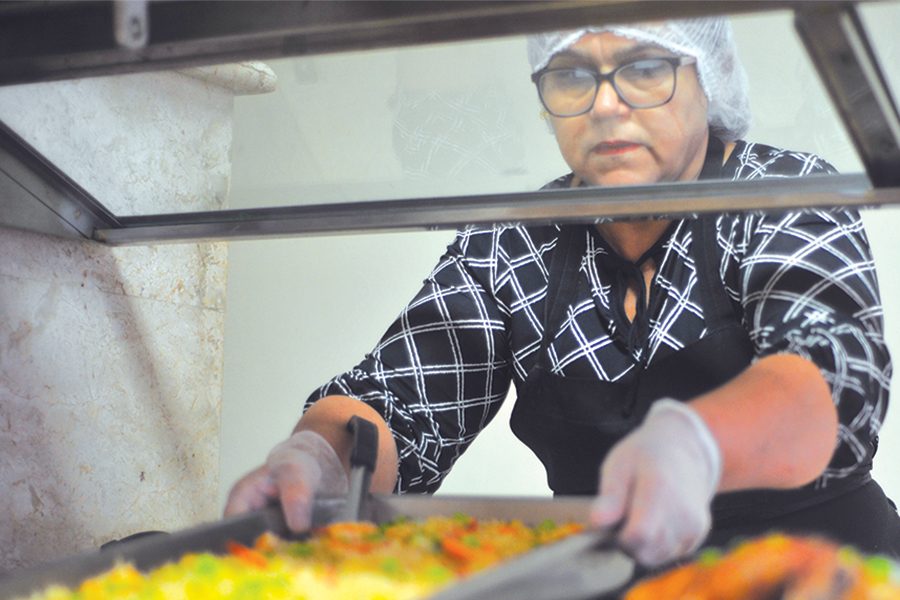Businesses help families survive
Local food, transport companies keep hiring undocumented workers
Denis Perez / The Advocate Richmond resident Roseline Soza places a full tray of rice into the buffet line at La Fusion restaurant on 23rd Street in Richmond.
Mar 29, 2017
RICHMOND — Despite high political tension nationwide over various proposed immigration policies, undocumented immigrant workers here are still working to provide for their families.
With the possibility of deportation looming one executive order away, some people are so afraid of being separated from their families that many refuse to speak about the subject.
“I know for a fact that there are many stores in the area that employ undocumented immigrants,” Bella Brazil Travel Agency owner Marcelo DeSouza said.
DeSouza said an owner’s major fear is that their business might get in trouble for saying they hire undocumented immigrants. Even though some workers might have some form of identification or a worker’s permit but are not yet fully documented.
“Especially if they have an open case for full legalization.”
According to a Pew Research report from 2008, undocumented immigrants make up 13 percent of the restaurant industry staff and cooks make up about 20 percent of undocumented workers.
La Fusion restaurant on 23rd Street in Richmond, between Hellings Avenue and Dunn Avenue, is owned by Carol Lopez.
Lopez said she immigrated to the United States from Mexico about 12 years ago to seek a better quality of life.
“I wanted to get away from all the violence and all the crime,” Lopez said.
After becoming a citizen through the naturalization process, she opened her restaurant to help her family.
She said her family investment yielded more than she imagined.
“We have been here for about two years,” she said. “In those two years this restaurant has helped my family’s financial stability immensely.“
Lopez said she hires undocumented workers, but currently only her family is working at the restaurant.
She said she hires undocumented workers who are visiting from other countries and only staying in the United States for a couple of months.
“There is no law that says I can’t hire someone who is undocumented,” Lopez said.
Despite the government providing options like Deferred Action for Childhood Arrivals (DACA) and the Development, Relief, and Education for Alien Minors (DREAM Act), not everyone fits into these programs.
Lopez said the members of the community who she met while working at her restaurant established beneficial relationships.
She said she purchases the fruits and vegetables that she uses at her restaurant at a local produce market.
This affiliated business is also owned by a family of immigrants.
“It’s like a circle,” Lopez said. “We all rely on each other to get by — especially during this time.”
She said immigrants living in the United States know they will not receive help from the government, but can rely on people in the community.
Corporations worth multi-billions of dollars also rely on undocumented workers to remain competitive in the market.
“When I first arrived in California I was working at this restaurant in San Francisco that hired undocumented people,” Lyft driver, based out of El Sobrante, Felipe Baptista said. “I was earning $9 an hour, plus tips, as a waiter.”
Baptista said when he heard about Lyft, a taxi company that processes orders through a mobile app, he applied for the AB 60 California driver’s license.
The AB 60 driver’s license does not require a Social Security number or proof of legal residence in order to apply for Lyft.
Baptista said he was worried about Lyft’s background check policy, but applied anyway using his Brazilian CPF number — which is equivalent to a Social Security number.
“Lyft will hire anyone,” Baptista said. “People use fake socials, tax I.D. numbers, or whatever they have from their home country.”
In 2015, Lyft’s CEO John Zimmer said the company had about 100,000 drivers employed and were serving about 1 million rides a week.
“That company would not exist if it weren’t for undocumented immigrants,” Baptista said. “Americans would not work as much as we do to earn so little without benefits.”
He said most Lyft drivers make around $1,000 a week based on commission per ride, but they have to pay for their own gas and car maintenance.
“I work 14-hour shifts to be able to earn enough to pay rent and survive.”
Baptista said drivers who work for Lyft or Uber in their home country do not have to inform the company if people leave their country of origin and begin working internationally.
They must present a driver’s license and proof of insurance in the state they are currently living in in order for the companies to activate them as a driver.
“Since I am technically an independent contractor, I was able to get a tax I.D.,” he said.
“I don’t know how these companies explain to the IRS the money they make, but I am trying to stay here — and you can bet that I am going to pay my taxes.”



